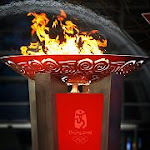Beijing Olympics: Political Battleground?
By Leta Hong Fincher
Washington
24 April 2008
Olympics Politics report / Broadband - Download (WM)
Olympics Politics report / Broadband - Watch (WM)
Olympics Politics report / Dialup - Download (WM)
Olympics Politics report / Dialup - Watch (WM)
A wide range of political groups is using the 2008 Beijing Olympics as an opportunity to pressure the Chinese government to change its human rights practices. Some argue that the Olympics should be separate from politics. But analysts say the Olympics have often been used for political purposes in the past. VOA's Leta Hong Fincher has more.
Former Olympic swimmer Nikki Dryden is a member of Team Darfur, a coalition of some 300 athletes seeking to raise awareness about the violence in Darfur and China's ties with Sudan.
"When China decided to host the Olympic games, they made a promise, a global promise to the sporting community that they would uphold the values of the Olympic games,” Dryden said. “Those values are to promote peace and human dignity. That's not happening in Darfur."
Olympic protester
Whether the cause is Darfur, Tibet or China's overall human rights record, a wide range of groups is using the Beijing Olympic Games as a platform for protests against the Chinese government.
Demonstrators in France, the United States and other countries have disrupted the Olympic torch relay. The anti-Chinese protests have sparked an outpouring of nationalistic anger in China. China's foreign ministry says the Olympics should be free of political interference.
"What we have seen is not protest, but cruel and violent attacks on the Olympic flame, which belongs to the whole world," says Chinese spokeswoman Jiang Yu.
In the United States, all three presidential candidates have called on U.S. President George Bush to send a message.
Senator Hillary Clinton, D-Presidential Candidate: "The president should not attend the opening ceremonies at the Olympics."
Senator Barack Obama, D-Presidential Candidate: "I think it's appropriate for the president to decline the invitation to the opening ceremonies."
Senator John Mccain, R-Presidential Candidate: "I would not go to the opening ceremonies."
However, President Bush says he will attend the Games. "I don't view the Olympics as a political event. I view it as a sporting event," he said.
David Wallechinsky
Olympics historian David Wallechinsky says the Olympics have often been used for political purposes. "The Olympics are part of the world, and politics is part of the world, so it's an illusion to think that you can separate the Olympics from politics," he said.
Wallechinsky points to the 1936 Berlin Olympics under Adolf Hitler's rule as the first time politics intruded into the Games in a major way.
"When Hitler took power, there was a great deal of discussion in the Olympic movement and also around the world: 'What should we do? Should we move the Olympics? Should we boycott the Olympics?' In the end nothing was done and the Olympics were held in Nazi Germany," explains Wallechinsky. In 1936, African American athlete Jesse Owens defied Nazi ideas of Aryan superiority by winning four gold medals.
In 1968 at the Mexico City Olympics, U.S. sprinters Tommie Smith and John Carlos used a black power salute at the medals ceremony to protest racial discrimination in the United States.
In 1972 at the Munich Olympics, Palestinian terrorists killed 11 Israeli athletes.
In 1980, after the Soviet invasion of Afghanistan, the United States led a boycott of the Moscow Olympics.
And in 1984, Soviet bloc countries retaliated by boycotting the Los Angeles Olympics.
Now, many political activists say they have learned from the past that Olympic boycotts only punish athletes and fail to bring about policy changes.
"A boycott is going to punish the wrong people. It is going to take away from the athletes who have trained their whole life for this moment,” Dryden said. “And we really just want to see a celebration of all those good things that happen during the Olympics."
Dryden says Team Darfur is instead encouraging athletes to speak out about human rights while attending the Beijing Olympics.
Thursday, April 24, 2008
Subscribe to:
Post Comments (Atom)


No comments:
Post a Comment